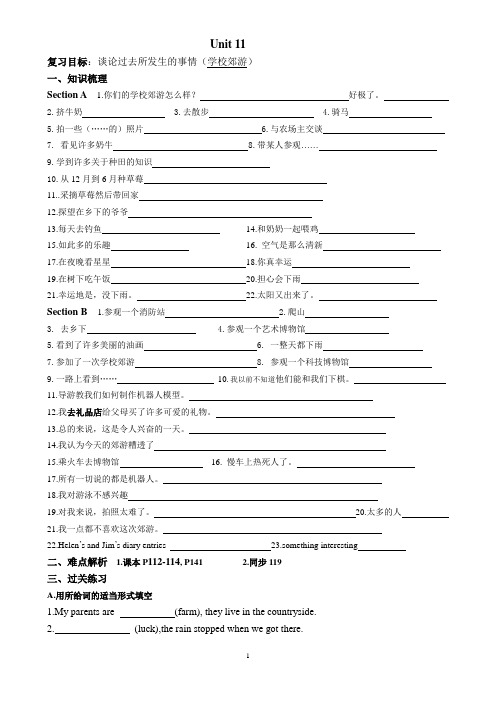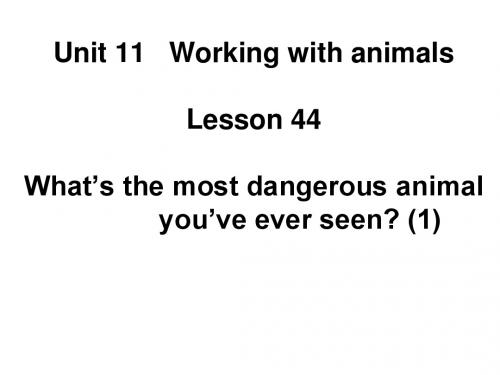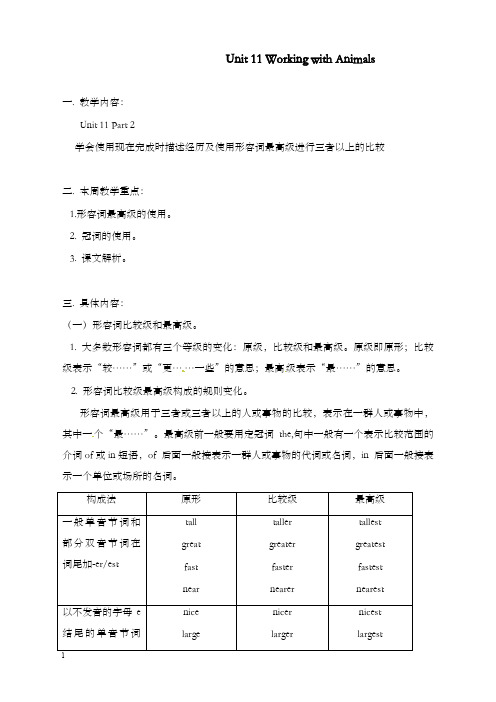英语:Unit 11 Working with Animals重难点复习(北师大版八年级下)
- 格式:doc
- 大小:50.50 KB
- 文档页数:5

Unit 11复习目标:谈论过去所发生的事情(学校郊游)一、知识梳理Section A 1.你们的学校郊游怎么样?好极了。
2.挤牛奶3.去散步4.骑马5.拍一些(……的)照片6.与农场主交谈7.看见许多奶牛8.带某人参观……9.学到许多关于种田的知识10.从12月到6月种草莓11..采摘草莓然后带回家12.探望在乡下的爷爷13.每天去钓鱼14.和奶奶一起喂鸡15.如此多的乐趣16. 空气是那么清新17.在夜晚看星星18.你真幸运19.在树下吃午饭20.担心会下雨21.幸运地是,没下雨。
22.太阳又出来了。
Section B 1.参观一个消防站 2.爬山3.去乡下4.参观一个艺术博物馆5.看到了许多美丽的油画6.一整天都下雨7.参加了一次学校郊游8.参观一个科技博物馆9.一路上看到……10.我以前不知道他们能和我们下棋。
11.导游教我们如何制作机器人模型。
12.我去礼品店给父母买了许多可爱的礼物。
13.总的来说,这是令人兴奋的一天。
14.我认为今天的郊游糟透了15.乘火车去博物馆16. 慢车上热死人了。
17.所有一切说的都是机器人。
18.我对游泳不感兴趣19.对我来说,拍照太难了。
20.太多的人21.我一点都不喜欢这次郊游。
22.Helen’s and Jim’s diary entries 23.something interesting二、难点解析 1.课本P112-114, P141 2.同步119三、过关练习A.用所给词的适当形式填空1.My parents are (farm), they live in the countryside.2. (luck),the rain stopped when we got there.3.Gina is a (love) girl.4.Many kids are (interest) in computer games.5.It was (sun) yesterday.6.There are two (paint) on the wall.7.The old man walked (slow) to the park.8.My brother (teach) me how to play chess last night.9.Listen!Jenny (sing ) . 10. Let’s (去钓鱼)。


重要知识 U11练习巩固:1. 2. 3.4. 5.6. 7.练习巩固:1. 这是我们的工厂,凯会带你到处转一下。
8. 2.你昨天在农场骑马了吗?9. 3.我们学到了很多有关务农的知识 10.4.我喜欢参观农场因为可以看很多的动物。
11. 5.上周我和朋友参观了一个农场12.6. 小鸡很可爱,我喂了它们一些米饭。
13. 7. 雨停后太阳出来了。
14. 8. 在火车上是如此地热。
15.练习巩固:1. 我们都知道他对学英语很感兴趣。
2. 我在公园里拍了很多照片。
Unit 11 重要的基础知识1.所有的时态都体现在谓语动词上●●在含有be常见的有am变is变 are变变●do和does的过去●2.过去式的标志词比较多,总的来说分为以下三大家族:或者at等冠词。
3.动词过去式的变化规则(1)(2)以e(3)以辅音字母+y(4)过去时练习巩固(7)There were some elephants in the zoo. (改为否定句)(8)The farmer grew some strawberries on the farm. (改为否定句)(11)They went to the mountains yesterday morning. (对画线部分提问)(12)I bought some candles for my grandmother last weekend. (改为一般疑问句)(13)were these chicken hamburgers delicious? (做否定回答)(14)Jill’s summer vacation was boring. (就画线部分提问)(15)The weather was very bad. (对画线部分提问)4.请思考quite a lot什么时候后面要加of:选填quite a lot或者quite a lot of:(2) Did you see any cows?5.anything和something的使用和当nothing, everything和anything练习:(1)(2)I did something interesting yesterday morning. (改为一般疑问句)6.副词可以修饰( )A.名词her.7.Not at all.not … at all8.9.几个看 see look watch read的区别是:10.。

Unit 11 知识归纳重点短语milk a cow 给奶牛挤奶ride a horse 骑马feed chickens 喂鸡show sb. around 带领某人参观grow / pick strawberries种植 / 采摘草莓go fishing 去钓鱼 e out 出现;出版in the countryside 在乡下;在农村go to the countryside 去乡下make a model robot 制作机器人go on a school trip 参加学校旅行go on a trip = take a trip = have a trip (to...) 去旅行learn about =know about了解;知道;熟悉learn a lot about ... 了解很多关于……的知识be interested in 对……感兴趣quite a lot (of ...) 许多in the dark 在黑暗中on the farm 在农场make a fire 生火(be) on fire 着火grow up 长大fire station 消防站science museum 科学博物馆gift shop 礼品店along the way 沿途all in all=in short 总之feed on 以……为食not ... at all 根本不;完全不;一点也不be worried about = worry about... 担忧……语法知识时态:一般过去时:谓语动词过去式动词过去式变化规则(直去双改)(一)规则动词1.一般情况直接加ed;2.以不发音字母e结尾,去e再加ed,3.以一个辅音字母结尾的重读闭音节结尾,双写末尾辅音字母,再加ed;重读闭音节:重读;辅元辅(音节);该音节中元音字母不发本音4.以辅音字母+ y结尾的动词,将y变为i ,再加ed:发音规则:清辅音后读/t/;元音,浊辅音后读/d/;/t/,/d/后读/ɪd/。

人教版七年级英语下册十一单元知识点汇总总结01、重点短语1. 去散步 go for a walk2. 喂鸡 feed chickens3. 给奶牛挤奶 milk a cow4. 骑马 ride a horse5. 许多 quite a lot (of)6. 带领某人参观 show sb. around7. 在乡下 in the countryside8. 去钓鱼 go fishing9. 种植苹果 grow apples10. 摘草莓 pick strawberries11. 拍照 take photos (of)12. 爬山 climb a mountain13. 出来 come out14. 参观博物馆 visit a museum15. 消防站 fire station16. 进行学校旅行 go on a school trip17. 制作机器人模型 make a model robot18. 给......买...... buy...for...19. 总的说来 all in all20. 对......感兴趣 be interested in21. 一点也不 not...at all02、重点句子Grammar Focus 句子1. How was your school trip? 你的学校旅行怎么样?2. It was great. 太好了!3. Did you go to the zoo? 你去动物园了吗?4. No, I didn’t. I went to a farm. 不,没有,我去了农场了。
5. Did you see any cows? 你看见一些奶牛了吗?6. Yes, I did. I saw quite a lot. 是的,我看见了。
我看见了相当多(的奶牛)。
7. Did Carol ride a horse? 卡罗尔骑马了吗?8. No, she didn’t. But she milked a cow. 不,她没有。

Unit 11 Working with Animals一. 教学内容:Unit 11 Part 2学会使用现在完成时描述经历及使用形容词最高级进行三者以上的比较二. 本周教学重点:1.形容词最高级的使用。
2. 冠词的使用。
3. 课文解析。
三. 具体内容:(一)形容词比较级和最高级。
1. 大多数形容词都有三个等级的变化:原级,比较级和最高级。
原级即原形;比较级表示“较……”或“更……一些”的意思;最高级表示“最……”的意思。
2. 形容词比较级最高级构成的规则变化。
形容词最高级用于三者或三者以上的人或事物的比较,表示在一群人或事物中,其中一个“最……”。
最高级前一般要用定冠词the,句中一般有一个表示比较范围的介词of或in短语,of 后面一般接表示一群人或事物的代词或名词,in 后面一般接表示一个单位或场所的名词。
thinnermos tpopular—more popular—the most popularimportant—more important—the most importantserious—more serious—the most seriousoutgoing—more outgoing –th e most outgoing5. 最高级的基本用法:1)三者或三者以上相比较用“the+最高级+名词+范围”。
This is the cleanest place of the city.Jack is the tallest boy in our class.2)表示“最……之一”,用“one of the +形容词最高级+复数名词”This is one of the most interesting books that I’ve ever read.3)形容词的最高级前面必须加定冠词the,但当形容词最高级前面有物主代词修饰时,则不加the.This is my the best friend.This is my best friend.Today is happiest day of my life.Today is the happiest day of my life.(二)冠词的用法:不定冠词的用法:1)用于第一次提到的单数可数名词前,表示类别,泛指某一类人或物。
Unit11: How was your school trip? 重点知识和语法讲解一、重要短语和句型1.go for a walk=take a walk 去散步k a cow 给奶牛挤奶3.ride a horse 骑马4.feed chickens 喂鸡5.talk with... 和...谈话6.take photos 拍照7.quite a lot (of)... 许多8.show sb. Around 带某人参观9.learn about 了解;知道10.from... to... 从...到...11.grow strawberries 种植草莓12.pick strawberries 摘草莓13.in the countryside 在乡下14.go fishing 去钓鱼15.at night 在夜晚e out 出来17.go on a school trip 参加学校旅行18.along the way 沿途19.after that 之后20.all in all 总的说来21.take a /the train 乘火车22.be interested in 对...感兴趣23.not...at all 根本不;完全不24.so much fun 如此多的乐趣25.fire station 消防站26.make a model robot 制作机器人模型27.climb the mountains 爬山28.How be...? ......怎么样?29.How do/does +主语+feel about...? ...对...感觉如何?30.teach sb. how to do sth. 教某人怎样做某事31.buy sth. for sb. =buy sb. sth. 为某人买某物32.It’s +形容词+to do sth. 做某事是...的33.sound+形容词听起来...二、重要知识点讲解1.feed 及物动词,“喂养;饲养”,过去式是fed。
七年级下册英语Unit 11知识点与语法精讲精练词汇梳理(一)完成单词梳理:名词:1. 奶牛 2. 马 3. 农民;农场主4. 乡村;农村5. 花6. 太阳7. 博物馆8. 火;火灾9. 油画;绘画10. 机器人11. 导游;向导12. 礼物;赠品动词:1. 挤奶 2. 喂养;饲养 3. 种植;生长;发育4. 采;摘5. 听到;听见代词:1. (常用于否定句或疑问句)任何东西;任何事物2. 所有事物;一切副词:1. 相当;完全 2. 昨天 3. 幸运地;好运地形容词:1. 极好的;优秀的 2. 使人兴奋的;令人激动的3. 可爱的4. 昂贵的5. 廉价的;便宜的6. 缓慢的;迟缓的7. 感兴趣的8. 黑暗的;昏暗的兼类词:1. (n)农场(v)务农;种田2. (v/n)担心;担忧3. (adv/adj)快地(的)(二)词汇变形小结:1.feed 喂养;饲养(v.) →____________ (过去式)2.farm 农场;务农(n./v.) →____________ (n.)农民;农场主3.grow 种植;生长;发育(v.) →____________ (过去式)4.lucky 幸幸幸(adj.)→ ____________(adv.)幸运地→ ____________(n.)运气5.paint 幸幸(v.) →____________(n.)幸幸幸幸幸→____________(n.)幸幸6.excite 幸……幸幸(v.) → ____________(adj.)使人兴奋的→ ____________(adj.)兴奋的;激动的7.love 爱(n.) → ____________(adj.)可爱的8.interest 使……感兴趣(v.) → ____________(adj.)感兴趣的→ ____________(adj.)有趣的9.hear 听到;听见(v.) → ____________(过去式)【练一练】用所给词的适当形式填空1.I ____________ (feed) some chicken with my grandparents yesterday.2.Your photos are ____________ (love). Do you want to see some of ours?3.My friends and I are ____________ (interest) in English.4.There are different kinds of ____________ (flower) in the park.5.The villager often ____________(grow) strawberries. His strawberries sell well.6.She was very ill, but ____________ (lucky) she is now out of danger.7.These ____________ (farm) are very friendly to us.8.I live on a farm. My mother ____________ (milk) a cow every day.9.I saw some beautiful ____________ (paint) in the art museum.10.Many boys in my class are interested in ____________ (play) soccer.(三)短语攻关:去散步给奶牛挤奶骑马喂鸡许多和某人交谈带某人参观……摘草莓在乡下;在农村去钓鱼爬山出现消防站进行学校旅行礼品店总的来说对……感兴趣一点也不知识点梳理1. Did you learn anything? 你学到什么东西了吗?【用法详解】anything是由any+thing构成的复合不定代词,意为“任何东西;任何事物”,常用于否定句、疑问句中。
八年级英语下册Unit11WorkingwithAnimalsPart1重难点讲解北师大版Unit 11 Working with Animals一. 教学内容:Unit 11 part 1继续学习现在完成时来描述经历二. 教学重点:1. 现在完成时中ever, nev er 的使用。
2. 现在完成时中的两种动词的使用。
3. 现在完成时与一般现在时,一般过去时的区分。
4. 重点词组。
三. 具体内容:(一)Present perfect with ever and never.e.g.Have you ever seen a polar bear?I have never seen a polar bear.Have yo u ever forgotten your homework?No, never.I’ve seen a dolphin, but I’ve never seen a whale.(二)Two types of verbs in the present perfect.1. There are two types of verbs in the presen t perfect. One type refers to an action that starts in the past and continues to the present. The time phrases with for or since are used with this type of verbs.e.g.He has had the book for three weeks.I have worked here for two months.He has been a teacher for ten years.They have lived in Canada since 1997.He has taught me since I came to this school.注意:for + 时间段如:for ten yearssince +时间点如:since nine o’clocksince + 时间段 + ago:since ten years agosince + 一般过去时态从句(主句是现在完成时)e.g.(1) They have lived in China _____ 1998.(2) We have studied English _____ 5 years.(3) Joy _____ ______ (learn) Chinese since she _____ (come) to China .2. The other type refers to an action that took place at a specific time in the past a nd cannot continue. Usually, for or since are not used.e.g.He has bought a book.The film has begun.I have borrowed a book from the library.注意:瞬间动作不能与表示一段时间的短语连用,应改用持续性动词。
Unit 11.Working with animalsProject Theme:Unit 11. Working with animalsTeaching Aims:1. Knowledge aims:(1) Help students know different animals.(2) The students will learn the present perfect.(3)The students will know the occupations working with animals.2. Ability Aims(1) Develop their visual thinking ability by enjoying pictures.(2) Give students a chance to discuss and improve their spoken English.3. Affective Aims(1)Inspire students’ love to the animals.(2)Call on students to protect animalsDifficult Points:1. The usage of the present perfect.2. Different animals’ vocabularies.Teaching Aids:Blackboard, PowerPoint, multi-media classroomTeaching Methods:1. Question and answer2. Communicative teaching3.Task-basing learning Teaching Procedures:In the teaching process, we have 6 steps concerned with the working with the animals.Step 1 I will show 4 pictures to students and ask then to tell methe names of the animals.Then I will ask students to tell memore animals using English and write down the names thestudents say. Then I will ask them read the vocabulariesafter me.Step 2 I will show a lot of occupations and ask them to checkthe jobs in which people work with animals.By askingthem”Can you think of more jobs in which people workwith animals? ”,I will write down the jobs they say.And Iwill ask them read the vocabularies after me.Step3 I will show 4 pictures and let them guess the job of thepeople in the pictures. By quoting what people in thepictures say,I will stress the present perfect.Step 4 In this part, I will focus on the present perfecttense.Firstly, I will explain the definition.Secondly , I willexplain the structure of the present perfect tense frompositive,negative ,general question and interrogativesentences and give some example sentences in order tohelp students understand this grammar better.Thirdly, I willexplain the differences between the durative verb andmomentary verbs.Then I will give some exercises and askstudents to answer.Step 5 This part, there is a group study. I will gave a chart with4 persons’information and list the structuresentences .Below the chart,there are some examplesentences .I will students to work in pair to practice usingthe present perfect tense. Then I will ask some students topractice.Step 6 This part is the display of the blackboard.It includes thenames of different animals and the example sentences. Homeworks:1.Recite all the vocabularies in this unit.2.Finish the exercises of this unit.3.Make 10 sentences using the present perfect.。
Unit 11 Working with Animals一. 教学内容:复习Unit 11二. 教学重点:1. 复习形容词的比较级和最高级。
2. 形容词-ed和-ing的区分。
3. 课文重点词组。
三. 具体内容:(一). 形容词比较级和最高级1. 大多数形容词都有三个等级的变化:原级,比较级和最高级。
原级即原形;比较级表示“较……”或“更……一些”的意思;最高级表示“最……”的意思。
2. 形容词比较级最高级构成的规则变化。
形容词最高级用于三者或三者以上的人或事物的比较,表示在一群人或事物中,其中一个“最……”。
最高级前一般要用定冠词the,句中一般有一个表示比较范围的介词of或in 短语,of 后面一般接表示一群人或事物的代词或名词,in 后面一般接表示一个单位或场所的名词。
popular—more popular—the most popularimportant—more important—the most importantserious—more serious—the most seriousoutgoing—more outgoing –the most outgoing5. 最高级的基本用法:1)三者或三者以上相比较用“the+最高级+名词+范围”。
This is the cleanest place of the city.Jack is the tallest boy in our class.2) 表示“最……之一”,用“one of the +形容词最高级+复数名词”This is one of the most interesting books that I’ve ever read.3) 形容词的最高级前面必须加定冠词the,但当形容词最高级前面有物主代词修饰时,则不加the.This is my the best friend.This is my best friend.Today is happiest day of my life.Today is the happiest day of my life.(二)形容词-ed和-ing的区分—Do you think these jobs are interesting?—I’m not interested in these jobs.在类似interest这类词后加-ed, 表示(人)感到……,在后面加-ing,表示事物或人让人感到……如:exciting excited interesting interested embarrassing embarrassed boring bored surpris ing surprised moving moved disappointing disappointedEx. Choose the correct word to fill in the blanks.(exciting, excited)I’ve got some very _____________ news for you.I’m very _____________ because we are going to New York.(interesting, interested)I wasn’t sure if he was really _______________ or if he was just being polite.Did you meet any ______________ people on the plane?(embarrassing, embarrassed)I felt ________________ about how messy the house was.She asked a lot of _________________ questions.(boring, bored)The job was so _________________.After a while, I got _______________and left.(三)课文词组1. stay at a five-star hotel2. swim in the Pacific Ocean3. feed animals4. hunt wild animals5. protect wild animals6. continue to do7. reduce the killing of8. allow people to kill9. in difficult conditions10. take photos of11. hurt my leg12. run all over the set13. train animals[课堂练习]一. 用所给单词的正确形式填空。
1. Playing football is an (interest)game. Many people are (interest) in it.2. She was (please) at the (please) news.3. I found her greatly (excite) after watching the (excite) TV play.4. The movie Batman and Joker is (excite) one that I have ever seen.5. This TV show is too (excite). I’d rather listen to music.6. His home is the closest to school but my home is (far).7. This film is one that I have ever seen.(bad)8. I think this book is than that one. (bore)9. Which do you like , pandas, monkeys or tigers? (well)10. In the morning Jane is . Tonny is than her. Peter is the one of the three.(early).二. Fill in the blanks1. A: Lily is not here. Where is she?B: She _______ to Shanghai.A: Wow! She is lucky. ______ you ever ______ to Shanghai?B: Yes. I ______________ there once.A: When ______ you _____ there?B: I ______ there last year.2. A: Look! What are they doing?B: They _________ a kite.A: _____ you ever ______ a kite?B: Yes. I ________ a kite only once.A: When _____ you _____ a kite?B: Last weekend. I ______ a kite with my parents.A: Where _____ you _____ a kite?B: We _____ a kite in Chaoyang Park.A: Do you like _______ a kite?B: Yes, very much.三. 单选1. have you lived in Beijing ?A. How longB. How oftenC. How muchD. How soon2. He’s been back home , ?A. isn’t heB. is heC. has he D,. hasn’t he3. They have stayed here last year .A. forB. sinceC. fromD. ever4. Mary has Shanghai for six months .A. come toB. arrived atC. left D stayed in5. I don’t want you yourselves .A. hurtingB. hurtC. to hurtD. hurted6.I have not seen her 1991.A. forB. sinceC. inD. about7. He the League for three years .A. joinedB. has joinedC. is inD. has been in8. He has had the bike two years ago .A. forB. sinceC. aboutD. \9. Have you ever _______ to America?A. goB. goneC. beenD. went10. Everybody ________. He feels very lonely.A. goB. has goneC. have goneD. goes。